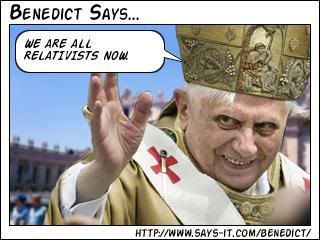In defence of (weak) atheism
Gerry (diogenesian discourse) claims that agnosticism is the only reasonable position one can adopt, and . . . well . . . I really must take issue.
On the subject of the existence or non-existence of god (or gods), I argue that there can only be three philosophical positions (as defined by me) which a person can adopt:I think there's something missing from this typology, but we'll get to that later.
- Theism: The belief that it is true that there is a god (or gods).
- Agnosticism: The belief that we do not know, in any scientifically or logically acceptable way, whether or not there is a god (or gods).
- Atheism: The belief that it is true that there is no god (or gods).
Knowing: Being able to demonstrate, either scientifically (via the laws of physics), or logically (beware the fallacies of logic), that something is true.Knowing is not the opposite of believing. If you "know" something, according to the stated definition, this implies that you believe it, too. The definition of "believing" should therefore be altered to read: "Holding something to be true, regardless of whether one is able to demonstrate such truth either scientifically (via the laws of physics), or logically (beware the Fallacies of Logic)." In any case, Gerry qualifies his definitions of "knowing" and "believing" by proposing that "we are all believers in the sense of this discourse," by which I take him to mean that since we can never demonstrate the truth of anything absolutely, we can never be in the position of "knowing" anything.
Believing: Holding something to be true, but being unable to demonstrate such truth either scientifically (via the laws of physics), or logically (beware the Fallacies of Logic).
And hence I argue that the only reasonable position a person can adopt is that of agnosticism.
His conclusion? Of the three positions one can adopt re: the existence of god, atheism is the most contemptible. While theism is at least honest about its relationship to knowledge, atheists are "hypocrites, equivocators, sophists and/or obfuscators."
They claim to have a problem with True Believers whilst using all of the above tricks of the trade to confuse their interlocutors into believing that they (the atheists) know that there is no god (or gods).I shall be peddling something very like this pet obfuscation, but we'll get there soon.
I put it to you, dear reader, that an atheist is nothing more than a pig-ignorant lying bigot. Atheists steadfastly refuse to acknowledge that they are really agnostics. And please don't blur the boundary between atheism and agnosticism, that's another pet obfuscation atheists peddle.
And thusly I now propose a new way of categorising philosophical positions regarding the existence, or otherwise, of a god or gods:If theism, agnosticism and atheism--as Gerry has defined them--were indeed the only options available to us, I might agree with his argument. But once we recognise that atheism can be divided into "strong" and "weak" camps, a fourth option emerges. Gerry's definition refers to atheism in the "strong" sense; the "weak" position holds that in the absence of evidence, there is no reason to believe in the existence of God. The burden of proof, "weak" atheists hold, lies with those who hold that it is true that God exists, not with those who don't hold that it is true.As you can clearly see, dear reader, you are either an agnostic, a bigot, an idiot, or a liar.
- Agnostics i.e. claiming to have not enough knowledge regarding the existence (or non-existence) of a god or gods in order to form a scientificaly or logically consistent opinion on the subject
- True Believers in the existence (or non-existence) of a god or gods - also known as Bigots.
- Idiots and Liars.
That "weak" atheism is at least as reasonable a position to adopt as agnosticism, if not more, can be demonstrated easily if we replace "God" in Gerry's formulation with "Santa Claus" or the "Tooth Fairy." We have no evidence for the existence of either of these characters: it is therefore at least as reasonable--if not more--to say that, based on the evidence, we have no reason to believe in Santa or the Tooth Fairy (weak atheism), as it is to assert that we cannot know whether there is a Santa or a Tooth Fairy (agnosticism).
See: "Strong Atheism vs. Weak Atheism" (about.com)
UPDATE: Bruce's thoughts.
“There's nothing an agnostic can't do if he doesn't know whether he believes in anything or not”
--Monty Python.
UPDATE II: It appears my contribution to this debate has won me an enemy. Not quite what I intended: I guess I didn't realise that agnostics could be so fanatical about their agnosticism. I know better now.
UPDATE III: Austin Cline at atheism.about.com has weighed into the debate. (Thanks go to Gerry--who continues to send me his love--for the heads-up.)
UPDATE III: Austin Cline at atheism.about.com has weighed into the debate. (Thanks go to Gerry--who continues to send me his love--for the heads-up.)

















|